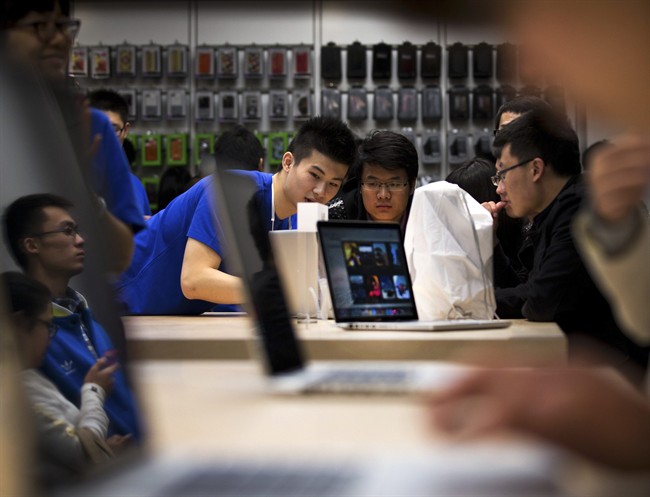TORONTO – For today’s students, back-to-school means new gadgets.

Forty-one per cent of post-secondary students plan to buy some sort of tech gadget before heading back to campus this fall and 38 per cent of students plan to buy a new computer, according to a survey released Monday by the Bank of Montreal.
But computers and other gadgets have some of the heftiest price tags on the back-to-school list, putting the pressure on both parents and students to stay within budget.
READ MORE: Back to school tips for laptops and tablets
Back-to-school shoppers have an advantage this year – Canadian retailers are in the midst of a “down and dirty price war,” according to Ken Wong, business professor at Queen’s University.
For example, just last week discount retailer Wal-Mart said it would continue to discount merchandise at the expense of its bottom line in hopes of stealing business from rivals like Target who recently entered the Canadian market.
While these price wars don’t necessarily revolve around computers, Wong said consumers can expect more flash sales and competitive pricing as stores fight for business.
So how do you know you are getting the best deal? Global News spoke with two experts on the topic, to help you be a savvier shopper.
Do your research: Informed shoppers get the best deals
Forget the saying, “The early bird gets the worm” – when it comes to back-to-school shopping the informed shopper gets the deal.
“Shops are always trying to balance their pricing for informed shoppers and uninformed shoppers,” said David Soberman, professor of marketing at the Rotman School of Business at the University of Toronto.
“The onus lies on the shopper.”
To start, Soberman suggests that every consumer do a search for the “best deals” on the product they have their eyes on in their area – for example, Google “Best price for (product) in (city).”
Soberman also suggests that shoppers come prepared with back up when hitting the stores.
“People often prepare themselves when they go shopping, but then when they are in the store they come across something that they didn’t have on their list. What people often do is buy the item out of convenience, but you do this without checking other prices – that’s where retailers get an advantage over you,” he said.
If you find yourself in this situation, make sure you have your smartphone with you so you can do a quick price comparison online. And don’t forget to ask the store what their price match policy is – you never know!
The newest, flashiest computers aren’t always the best deals
“Kids will come up with a million reasons why they need the latest and greatest,” said Wong. “But they may not need all of the computing power on the flashy model, in fact they might not even need this year’s model.”
The expert said to keep in mind that most of today’s computers become “out-of-date” very quickly, thanks to the speed at which technology is changing. Often times you can get a great deal on last year’s model and you will only be sacrificing a few features.
“Don’t base your decision entirely on price, weigh in how long you will want the computer,” he suggests.
“If you want a computer that will last for all four years of university, then you want to buy a better machine. If you think you will replace it in a couple of years then you can go with less.”
Stay away from most protection plans
One of the biggest things to remember about shopping for a computer, tablet, or smartphone is that retailers will push you to buy their added protection plans, which promise support past the manufacturer’s one-year warranty.
But both experts caution that these plans are often unnecessary expenses.
- Small grocers, co-ops receiving boost from Loblaw boycott: ‘A lot of anger’
- B.C. man losing vision needs to find home for treasured book collection
- U.K. bans generic passwords over cybersecurity concerns. Should Canada be next?
- More foreign interference action coming after inquiry report, India arrests: LeBlanc
READ MORE: Tips for saving money when back-to-school shopping
Retailers like Best Buy and Future Shop make close to 50 per cent of their profit on protection plans alone, according to Soberman.
Wong added that today’s technology is pretty reliable in the sense that if the device is going to conk out on you, it will likely happen within the first year when it’s still covered by the manufacturer’s warranty.
He also suggests that consumers look into their credit cards warranty policy – most major credit cards will double the warranty when you buy electronics on your card.
However, if retailers offer protection for user-caused damages – such as water damage or breakage – and you or your child has a reputation for being rough with their devices, you might want to consider the extra expense.
Wong adds one of the best accessories you can invest in for a laptop is a well-designed laptop case or carrying bag to protect from wear and tear.
Check on-campus computer stores before buying
Some of the most likely students in the market for computers and tablets are post-secondary students. But what most don’t realize is that the majority of university and college campus have on-site computer stores.
According to Wong, most of these on-campus stores will have good start of term deals and students who are entering specialized programs can breathe easy knowing the tech offered in store comes with their school’s stamp of approval.
READ MORE: Online price comparisons for back-to-school shopping
The added bonus for students is that they will have access to free IT help in case they run into problems.
Students should also inquire about free software bundles, as some schools may offer free one-year licences for things like Microsoft Office.







Comments